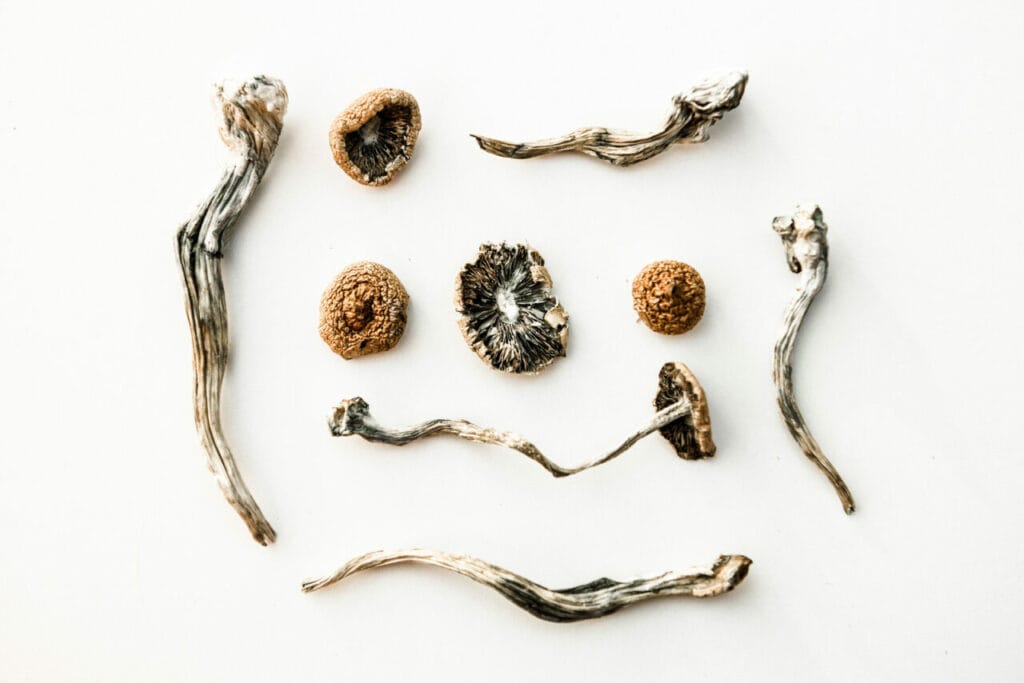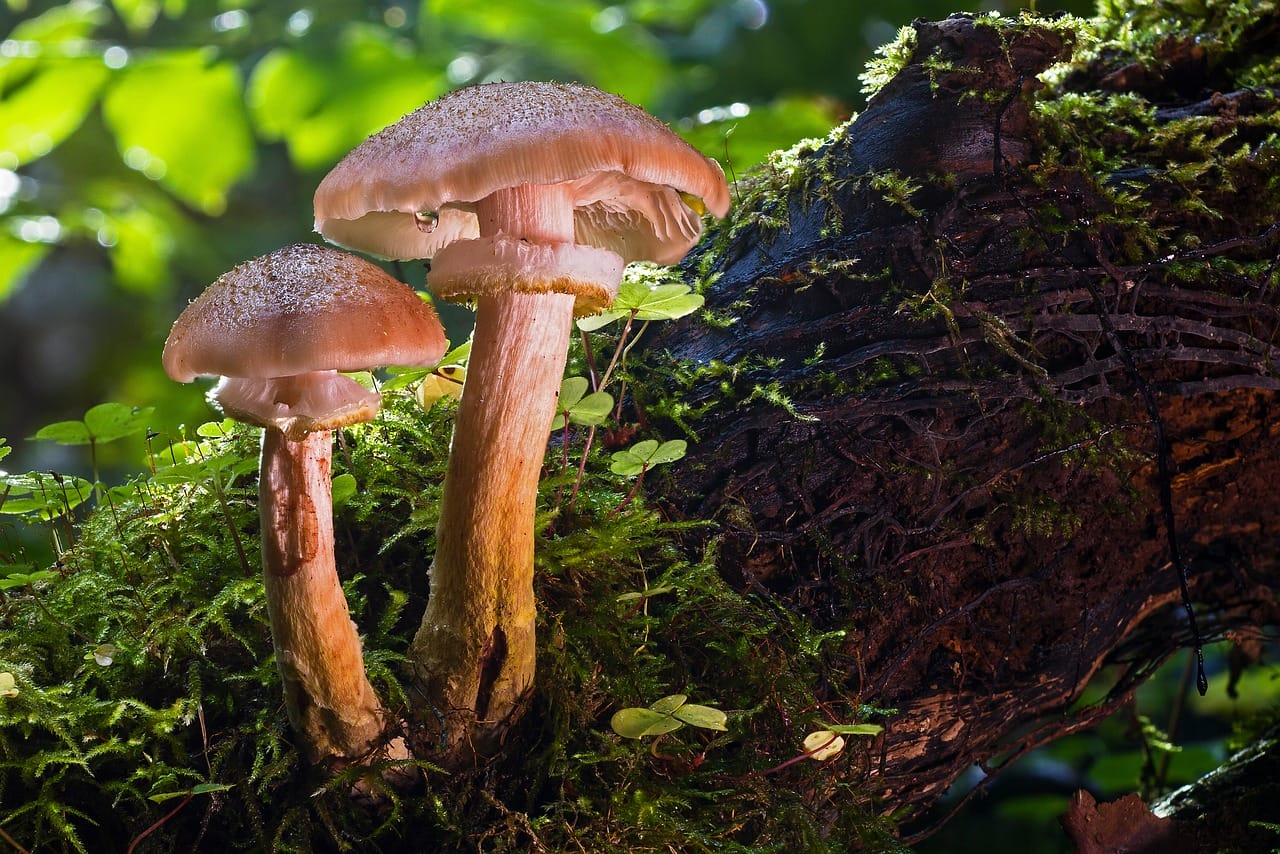Initially, magic mushrooms were primarily seen by many Canadians as a psychedelic substance used for recreational purposes. However, this perception changed when scientists started investigating psilocybin, the active ingredient in the mushrooms, and found it to be highly effective in treating various mental health conditions.
As the body of knowledge around the uses of psilocybin expands, so does the understanding of its potential applications. This increasing awareness makes it easier for people to obtain these products through magic mushroom delivery services. A recent study sheds light on its role in human consciousness, raising the question: could this be the reason for its profound impact on the human brain? Let’s probe further into this fascinating exploration of magic mushroom products.
Key Takeaways:
- Psychedelic magic mushrooms have played a role in the cognitive evolution of early humans, contributing to their survival.
- Mushrooms have a significant role in neurological health, given their ability to mitigate PTSD, depression, and anxiety.
- The influence of psilocybin on consciousness and brain function may have fostered creativity, introspection, and abstract thinking.

Magic Mushrooms: Historical Usage and Importance
Historical accounts show that our ancestors have been leveraging the power of psychedelic magic mushrooms since ancient times. Indigenous societies used these mushrooms in sacred rituals and traditional ceremonies to honor their gods. These mushrooms are found worldwide, notably in subtropical and tropical areas, including South and Central America, the Caribbean, Southeast Asia, and Africa.
Shrooms and Their Role in Ancient Civilizations
Indigenous communities in Mexico have long utilized these fungi for spiritual enlightenment, divine interactions, and religious ceremonies. The Aztecs of South America referred to the mushroom as “God’s Flesh,” integrating it into their healing rituals.
Evidence of mushroom use can be traced back to:
- Around 10,000 years ago in Australia
- Approximately 7,000 years ago in North Africa
- About 6,000 years ago in Spain.
These findings are often referenced by scholars as evidence of the widespread historical consumption of psilocybin. When individuals ingested mushrooms, they experienced a sense of euphoria, accompanied by hallucinations featuring complex geometric and visual designs.
The Significance of Mushrooms in the Bronze Age History of Spain
In the mid-1990s, scientists discovered remnants, including hair strands from approximately 200 Bronze Age societies, hidden within a cave in Minorca, Spain. These artifacts were exceptionally well-preserved, owing to the cave’s sealed entrance caused by fallen debris. Upon examination, these hair samples were found to contain traces of three alkaloids, known to alter the human mind and induce different states of consciousness.
This discovery provides intriguing insight into how and why ancient societies used these substances. Surprisingly, reaching an altered state of mind was considered normal during those times. However, the question about the impact of these substances on human evolution still persists.
Psilocybin and the “Big Bang Theory” of Human Consciousness Evolution
Recently, research into psychedelics has seen a revival, reinforcing the idea that psychedelics contributed to the evolution of consciousness. This notion, known as the stoned ape theory, was proposed by ethnobotanist Terence McKenna. The theory posits that the ingestion of psychedelics could have affected the cognitive and cultural evolution of humans.
According to Dr. Thomas Falk, a Philosophy and Education professor at the University of Dayton, this theory might potentially elucidate the so-called “creative explosion” that happened amongst Homo sapiens roughly 40,000 years ago, signifying a considerable leap in early human cognitive capabilities.
It’s hypothesized that psychedelics enabled early humans to explore self-created worlds. Over time, their enhanced cognitive abilities allowed them to reflect these experiences in their real-world environment.
In Terence McKenna’s “Food of the Gods“, he presents his arguments that the stoned ape hypothesis has its roots in ancient shamanistic rituals and a speculated variety of plants and fungi.
“Capability to Trigger Neurological and Psychological Transformations”
Psychoactive substances possess the potential to induce significant neurological and psychological transformations. These changes could have played a significant role in the development of our species.
The study adopts a multi-disciplinary approach, merging biology, ethnobotany, and neuroscience to scrutinize prior research on psilocybin and human consciousness. The theory is that early humans increased their consumption of these fungi as their surroundings shifted from forests to grasslands, which led to more exposure to animal feces. The study cites the “stoned ape” hypothesis, suggesting that this dietary change could have triggered considerable brain changes in early hominids.
Consequences of Consuming Psychoactive Substances
The potential effects of consuming these fungi could include enhanced hunting and scavenging skills, increased sexual desire, and heightened sensory awareness. Coupled with the impact of psilocybin on consciousness and brain function, it is plausible that these factors could have promoted creativity, introspection, and abstract thinking, all of which are vital for language evolution.
The Peruvian researchers who carried out the study stress the need for additional studies into the effects of these substances on the brain and human evolution. While it’s known that they have affected areas of the brain linked with memory, decision-making, and introspection, the evolutionary implications remain an active area of research.
An independent genetic study indicates that magic mushrooms emerged approximately 67 million years ago. Humans began consuming these fungi millions of years ago, far preceding the introduction of marijuana.
What Do Dried Magic Mushrooms Contain?
They contain a hallucinogenic substance named psilocybin. The effects can differ based on individual tolerance, body weight, and consumption method. Here are some potential effects:
- Extreme joy
- Sense of tranquility
- Spiritual awakening and introspection
- A dream-like state of feeling detached from one’s physical environment
- Altered visual perception, such as seeing light halos and vivid colors
- Boosted sense of well-being
Despite its recreational use, many people use it for its medicinal benefits, particularly for its positive effects on brain health.
Influence on Neurological Health
The active compound alters one’s mood, perception, and thought process by interacting with serotonin receptors in the prefrontal cortex. It enhances cognitive abilities, including the manipulation of visual and auditory experiences, thereby enhancing one’s task performance.
Historical Connection
The same concept can be traced back to our ancestral roots, particularly to the so-called “stoned apes”. The discovery and usage of these fungi, especially during their ecological transition from forest to grassland habitats, resulted in increased exposure to animal feces, which subsequently raised their intake of these mushrooms. The “stoned ape” theory, referenced in the study, suggests that this dietary shift could have induced significant changes in the brain structures of early hominids.
Psilocybin mushrooms consumption might have influenced the evolution of their consciousness and cognitive abilities. This could potentially explain how they developed essential survival skills.Present and Future Implications
Recent research indicates that individuals suffering from conditions like cluster headaches, anxiety, anorexia, obsessive-compulsive disorder, PTSD, and depression typically exhibit low serotonin levels. While selective serotonin reuptake inhibitors (SSRIs) are commonly used, they often take a significant amount of time to yield improvements. Conversely, shrooms can provoke immediate alterations in brain neuron connectivity.
Modern Psychedelic Research – Clinical Trials
Since the early 2000s, scientists have been exploring unique treatments designed for individual patient requirements for various psychiatric and behavioural disorders.
Given its ability to infiltrate the central nervous system and enhance cognitive function, it has proven effective in therapy. Recent research progress in 2020 indicates that psychedelic therapy using psilocybin products helps mitigate severe depression.
According to Matthew Johnson, a professor at Johns Hopkins Medicine, these substances alter the interaction between different brain systems. An increased connectivity between brain regions that usually don’t communicate effectively is observed. Conversely, areas that typically interact heavily show decreased communication.
This induced disarray is not merely a side effect but holds potential therapeutic value. People suffering from depression often find themselves in self-critical, repetitive thought patterns that worsen their condition. Psychedelics disrupt these patterns, enabling individuals to escape from their deep-rooted negativity during a psychedelic experience. The result is more flexible thinking and an enhanced ability to manage critical
Embarking on a Healing Journey: Order Magic Mushrooms Online
An extensive selection of these regulated substances is accessible online. Choose from a variety that is both safe and lab-verified, mitigating the risk of accidentally buying harmful mushrooms. Reliable sellers ensure the products they offer are of high quality and safe to use.
| Product | Psilocybin Content | Psilocin Content | Benefits |
| Enigma | 0.76% | 0.07% | Boosts Focus, Elevates Mood |
| Atlantic Treasure Coast | 0.59% | 0.08% | Improves Concentration, Spurs Creativity, Encourages Neuroplasticity |
| Blue Magnolia | 0.58% | 0.08% | Boosts Memory, Assists in Alleviating Depression and Anxiety |
| Cambodian | 0.45% | 0.06% | Assists in Managing PTSD and Anxiety, Supports Substance Abuse Recovery, Enhances Mood |
Revealing the Hidden Potential of Magic Mushrooms
Our current advancements, including civilizations, urbanizations, and societies, are the fruits of many developmental processes. Although the stoned-ape hypothesis may be a theoretical conversation between two individuals, scientists are steadily uncovering evidence supporting the role of psilocybin in human evolution.
If you’re in search of rapid cognitive development, look no further than Shroom Shop Canada’s magic mushroom delivery. We offer a broad spectrum of high-quality shrooms from A to Z, with fast shipping available in British Columbia and beyond.
Discover the future of personal growth — explore our selection of premium psychedelics online Canada today.
Commonly Asked Questions
Which type of mushrooms were consumed by ancient civilizations?
Various kinds of fungi exist around the world, so there isn’t a single type consumed by all cultures. Some favored the well-known liberty caps, while others opted for Psilocybe cubensis. Most either ate these mushrooms raw or created edible forms like tea blends.
What role do psychedelics play in contemporary human development?
In current times, psychedelics primarily function by activating the 5-HT2A receptor subtype. This interaction has proven beneficial for managing stress-related disorders and significantly enhancing creativity and social behavior. These effects can potentially improve adaptability and survival, especially in societies that rely heavily on knowledge and social cooperation.
Have spiritual practices involving shrooms influenced human evolution?
Yes, spiritual rituals that involve shrooms have indeed influenced human evolution, shaping our cultural, religious, and social structures. They foster a deep sense of unity, creativity, and community bonding.
Suggested Reading:





